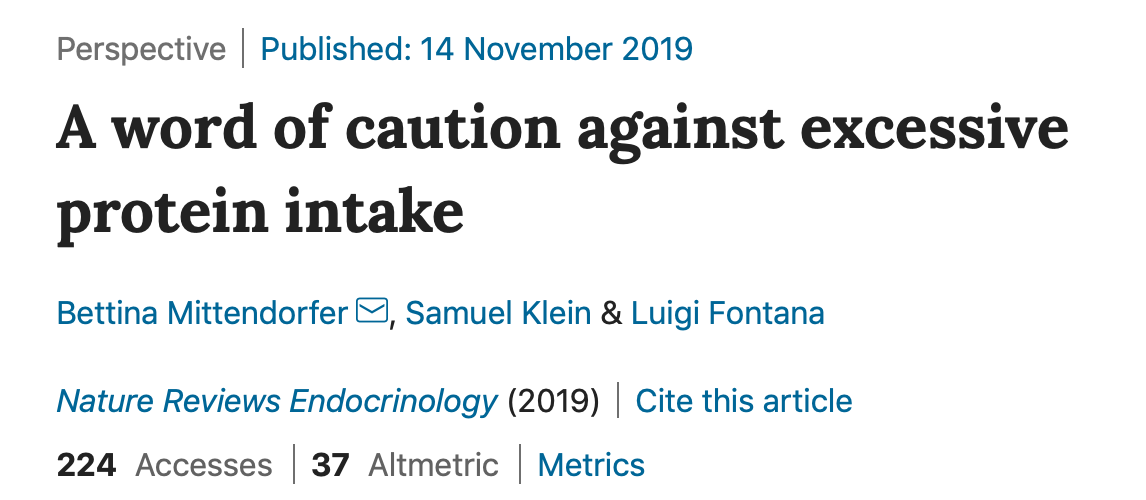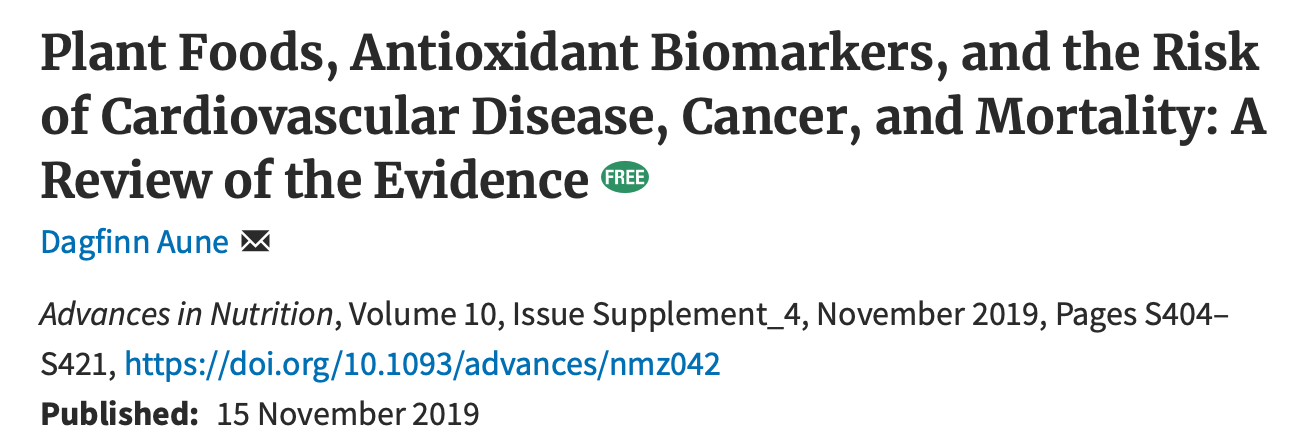A review of the weeks plant-based nutrition news 24th November 2019

AN EXCELLENT SET OF REVIEW PAPERS: Advances in Nutrition have published a set of open access papers based on the presentations at the 7th International Congress on Vegetarian Nutrition held in Loma Linda University, Loma Linda, CA, February 26–28, 2018. They are all well worth reading.
PROTEIN — IS MORE BETTER? The answer is most certainly no, yet people commonly raise concerns about obtaining enough protein on a plant-based diet. The simple answer is that if you are meeting calorie requirements then you will be obtaining enough protein, especially if you are eating a whole food plant-based diet.
This excellent paper reviews the evidence for eating more than the recommended daily intake (RDI) of protein, which is 0.8g/kg. Prevailing myths about protein consumption include; increasing protein intake will help build muscle, help maintain or reduce body weight and prevent insulin resistance. However, there is little scientific basis for these assumptions.
This review finds the following:
- No evidence to support a beneficial effect of high protein intake on total lean mass or muscle mass during weight maintenance or weight gain. In fact, the relationship between protein intake and muscle protein synthesis rate is saturable, reaching a maximum at ~30 g of protein. Amino acids from protein consumed in excess of this amount are degraded and oxidized — essentially lost in the urine.
- Increasing protein intake has no benefit for increasing muscle strength or physical function.
- Protein consumption stimulates insulin secretion but also impairs the action of insulin. During weight loss, high protein intake can blunt the beneficial effect of weight loss on glucose metabolism.
- High protein intake increases the risk of type 2 diabetes although this is related to animal protein consumption NOT plant protein.
The study concludes; ‘The results from both population and randomized experimental diet intervention studies conducted in people do not support the popular trend in the general population of increasing dietary protein intake beyond the RDI to increase muscle mass, overall physical function and glucose homeostasis’. So more is definitely NOT better and plant-derived protein is actually better for health. Several papers in different populations have now shown the benefit for health of substituting animal protein for plant-derived protein. This includes studies from the US, Japan and Finland.
VEGETARIAN DIET AND RISK OF GOUT: Gout is the most common inflammatory joint disease and an important risk factor for cardiovascular diseases, hypertension, kidney diseases, diabetes, all-cause and cardiovascular mortality. Gout is causes by excessive uric acid in the blood, which deposits as crystals in the joints. Around a third of uric acid comes from the metabolism of purines. Meat and seafood are rich in purines and a low purine diet is often advised for those who have a diagnosis of gout.
This study examined the association between a vegetarian diet and the risk of developing gout. Data were derived from two prospective cohorts studies from the Tzu Chi population. Tzu Chi volunteers are ‘devoted Buddhists who participate regularly in community charity work, local and international disaster relief, recycling and environmental projects, hospital volunteer work, and fundraising organized by the Buddhist Tzu Chi Foundation. All volunteers went through at least two years of training and had to quit smoking and alcohol drinking before becoming certified as Tzu Chi volunteers. These volunteers are encouraged to consume a vegetarian diet in order to protect animals and the environment’. About one-third of the volunteers were full-time vegetarians (either lacto-ovo vegetarians or vegans).
In both cohorts, the lacto-ovo vegetarians had significantly lower levels of uric acid compared to non-vegetarians. The first cohort study involved 4903 participants of which 65 developed gout. There was a 60% reduction in the risk of developing gout in the vegetarians compared to the non-vegetarians. The second cohort study included 9032 participants of which 161 developed gout. There was a 39% reduction in risk of gout amongst vegetarians. The reduced risk of gout is thought to be due to lower purine intake and thus lower uric acid levels, but also due to the anti-inflammatory properties of a vegetarian diet when compared to omnivorous diets.
Previous studies have also shown that plant-based diet patterns, including the DASH and Mediterranean diets are associated with lower uric acid levels and risk of gout.
WHAT IS THE OPTIMAL CONSUMPTION OF PLANT FOODS FOR DISEASE PREVENTION?: This paper reviews the available evidence supporting the consumption of various whole plant foods for prevention of cardiovascular disease and cancer and reducing overall mortality. The review found that the consumption of fruits, vegetables, whole grains, and nuts significantly reduced the risk of coronary artery disease, stroke, cardiovascular disease overall, total cancer, and all-cause mortality. The greatest reduction in disease risk was observed when fruits and vegetables were consumed at 800grams/day, whole grains at 225 g/d and nuts at 15–20 g/d. Whole-grain and nut consumption was also associated with reduced mortality from respiratory disease, infections, and type 2 diabetes. Blood concentrations of various antioxidants obtained from whole plant foods, including vitamin C, carotenoids, vitamin E, were strongly associated with reductions in cardiovascular disease, cancer, and all-cause mortality. Of note, one serving of fruits, vegetables, whole grain or legumes is about 80g. The author concludes ‘The current results strongly support dietary recommendations to increase fruit and vegetable intake, but suggest further benefits beyond the currently recommended 5-a-day up to an intake of 800 g/d, particularly for coronary artery disease and for mortality from stroke. The current results also support recommendations to increase whole-grain intake to 225 g/d and nut intake to 15–20 g/d. Diets high in plant foods could potentially prevent several million premature deaths each year if adopted globally’.

The Economist Nov 15th 2019
THE ENVIRONMENTAL IMPACT OF OUR DIET CHOICES: This is covered by an article in The Economist from which the picture is taken. It is clear that removing meat and dairy from the diet is essential to mitigate the effects of climate change. This reminded me of a study that examined the environmental impact of diet pattern in the Adventist Health Study 2 (AHS-2) and the EPIC-Oxford study. These 2 studies are the largest prospective cohorts examining the health impact of a vegan and vegetarian diet pattern. The analysis found that calorie for calorie, vegetarian diets in the AHS-2 and vegetarian/vegan diets in the EPIC-Oxford resulted in 29% and 47–60% less greenhouse gas emissions respectively when compared to non-vegetarian/meat-eating diets. It is encouraging to see that that the BBC are covering the negative impact of animal farming on the enviroment in a programme called ‘Meat: A treat to our planet?’
A COUNCIL IN SCOTLAND NOW PROVIDES VEGAN MEALS IN ALL ITS SCHOOLS: This is thanks to a challenge by a mother in Glasgow, supported by the Vegan Society. West Dunbartonshire Council now offer vegan meals in all its schools. Veganism is rising for reasons related to human and planetary health and animal justice. The Economist suggested that 2019 was the ‘Year of the Vegan’. Therefore, it is necessary for public sector institutions to provide vegan meals for students, staff and employees.
If you have found this article useful, please follow my organisation ‘plant-based health professionals UK’ on Instagram @plantbasedhealthprofessionals and facebook. You can support our work by joining as a member or making a donation via the website.




